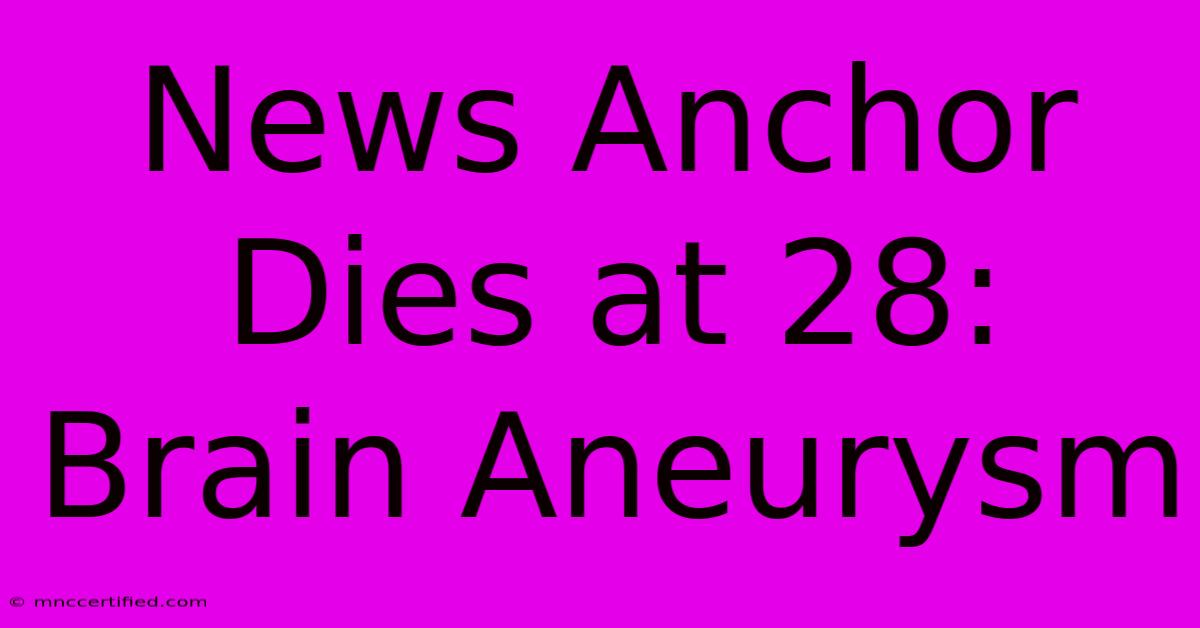News Anchor Dies At 28: Brain Aneurysm

Table of Contents
News Anchor Dies at 28: Brain Aneurysm - A Tragic Loss
The sudden death of [News Anchor's Name], a rising star in the news industry, has sent shockwaves through the community at the young age of 28. The cause of death, tragically, was a brain aneurysm. This devastating event highlights the often-silent threat of this condition and the importance of understanding its symptoms and risk factors.
Understanding Brain Aneurysms
A brain aneurysm is a bulge or ballooning in a blood vessel in the brain. These aneurysms can rupture, causing a life-threatening hemorrhage known as a subarachnoid hemorrhage (SAH). While many aneurysms never rupture, those that do can lead to severe disability or death. The symptoms can vary greatly, making early detection challenging.
Types of Brain Aneurysms
Several types of brain aneurysms exist, categorized by their shape and location:
- Saccular (berry) aneurysms: These are the most common type, resembling a small berry hanging from a blood vessel.
- Fusiform aneurysms: These are elongated bulges affecting a larger segment of the blood vessel.
- Mycotic aneurysms: These are caused by infections.
Symptoms of a Brain Aneurysm
Unfortunately, many brain aneurysms show no symptoms until they rupture. However, some individuals might experience warning signs before rupture, including:
- Severe headache, often described as the "worst headache of their life."
- Neck pain or stiffness
- Vision problems, such as double vision or blurred vision
- Sensitivity to light (photophobia)
- Nausea and vomiting
- Seizures
- Loss of consciousness
Risk Factors for Brain Aneurysms
While the exact cause of most brain aneurysms is unknown, certain factors increase the risk:
- Family history: A family history of brain aneurysms significantly increases the risk.
- High blood pressure: Uncontrolled hypertension is a major risk factor.
- Smoking: Smoking damages blood vessels and increases the risk.
- Drug abuse: Cocaine and methamphetamine use can increase the risk.
- Age: The risk increases with age, although aneurysms can occur at any age, as tragically demonstrated by [News Anchor's Name]'s death.
- Polycystic kidney disease: This genetic disorder increases the risk of aneurysms.
The Impact of [News Anchor's Name]'s Death
The untimely death of [News Anchor's Name] serves as a poignant reminder of life's fragility. [He/She] was a respected and beloved member of the [News Station Name] team, known for [mention positive qualities, e.g., their dedication, professionalism, kindness]. [Include a brief anecdote about the anchor, if possible, to personalize the story]. The news industry mourns the loss of a bright talent taken too soon.
Seeking Help and Prevention
If you experience any of the symptoms mentioned above, seek immediate medical attention. Early diagnosis and treatment are crucial in managing brain aneurysms. While there's no guaranteed way to prevent all aneurysms, maintaining a healthy lifestyle—including managing blood pressure, not smoking, and limiting alcohol and drug use—can reduce your risk.
Remembering [News Anchor's Name]
[News Anchor's Name]'s legacy will live on through the memories of those who knew and loved them. Their dedication to journalism and their warm personality will be deeply missed. This tragedy underscores the importance of cherishing each moment and recognizing the unpredictable nature of life.
Keywords: Brain aneurysm, brain aneurysm symptoms, brain aneurysm rupture, subarachnoid hemorrhage, SAH, news anchor death, [News Anchor's Name], young death, unexpected death, healthcare, health risks, prevention, risk factors, blood vessel, hemorrhage, medical emergency.
Note: This article is for informational purposes only and does not constitute medical advice. Always consult with a qualified healthcare professional for any health concerns or before making any decisions related to your health or treatment. Remember to replace bracketed information with the relevant details. For off-page SEO, consider outreach to relevant news publications and health websites.

Thank you for visiting our website wich cover about News Anchor Dies At 28: Brain Aneurysm. We hope the information provided has been useful to you. Feel free to contact us if you have any questions or need further assistance. See you next time and dont miss to bookmark.
Featured Posts
-
Simpsons End 20 Year Channel 4 Run
Dec 18, 2024
-
Us State Department On Vanuatu Earthquake
Dec 18, 2024
-
28 Year Old Anchor Ana Orsini Dies
Dec 18, 2024
-
Rayful Edmond Drug Kingpin Passes Away
Dec 18, 2024
-
Athletics Star Wins Bbc Spoty
Dec 18, 2024